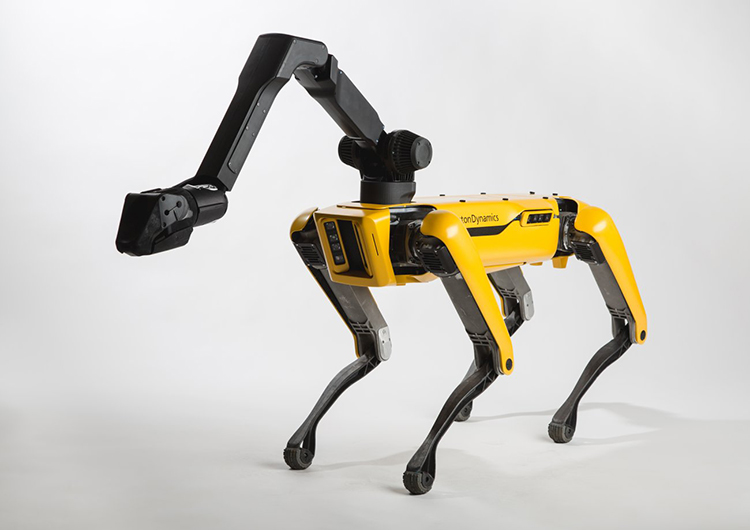
Boston Dynamics provides its canine robot in the fight against coronavirus
Boston Dynamics has modified its canine robot to make it more helpful in the fight against coronavirus.
In a blog post, the company says: “We have spent the last six weeks building and testing a payload and application architecture that would enable our robot, Spot, to help reduce exposure of frontline healthcare workers to the novel Covid-19 virus.”
Mobile robots play a vital role in removing people from dangerous environments, says the company, which developed the payload, hardware, and software for this application so that they are “generalizable and able to be deployed on other mobile robotic platforms with APIs and capacity for custom payloads”.
Boston Dynamics is sharing the results of its initial work deploying the robot with Bringham and Women’s Hospital in Massachusetts and is open-sourcing the hardware and software designs used to get these robots into the field.
“Our hope is that these tools can enable developers and roboticists to rapidly deploy robots in order to reduce risks to medical staff,” says Boston Dynamics.
Starting in early March, Boston Dynamics started receiving inquiries from hospitals asking if our robots could help minimize their staff’s exposure to Covid-19.
One of the hospitals that the company spoke to shared that, within a week, a sixth of their staff had contracted Covid-19 and that they were looking into using robots to take more of their staff out of range of the novel virus.
Based on these conversations, as well as the global shortage of critical personal protective equipment (PPE), the company spent the past several weeks trying to better understand hospital requirements to develop a mobile robotics solution with its robot, Spot.
The result is a legged robot application that can be deployed to support frontline staff responding to the pandemic in ad-hoc environments such as triage tents and parking lots.
Spot has already been present for several weeks at a local Boston facility, Brigham and Women’s Hospital, where the medical team uses the robot as a mobile telemedicine platform, allowing healthcare providers to remotely triage patients.
“We’re listening to their feedback on how Spot can do more but are encouraged by reports that using the robot has helped their nursing staff minimize time exposed to potentially contagious patients,” says the company.
Boston Dynamics adds: “With the deployment of our first healthcare-focused robot, we’re open-sourcing all of our work to empower mobile robotics platforms to leverage the same hardware and software stack that we’ve developed to help frontline healthcare workers. Below you’ll find an overview of how we are using (and plan to use) mobile robots to combat the spread of Covid-19.”
None of the services below are reliant on Boston Dynamics hardware or software, and in many instances, Boston Dynamics says wheeled or tracked robots may be a better solution for these applications.
Boston Dynamics has also been in “close contact” with Canadian field robotics firm Clearpath Robotics, and their CTO Ryan Gariepy, who said that they too are actively working to assist robotics developers and researchers around the world in their efforts to support our healthcare workers and maintain our critical infrastructure.
Additionally, the company is developing solutions to remotely measure a number of health indicators, such as:
- Body temperature
- Respiratory rate
- Pulse rate
- Oxygen saturation
Moreover, Boston Dynamics hopes to develop a robotic disinfection system next.


